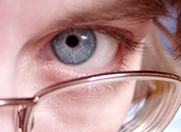|
Pediatric Ophthalmology
 Children should have their first eye exam at about age two, although it's never too early to test a child's vision and eye health. Comprehensive eye exams are essential in the diagnosis and treatment of vision problems, injury and disease. Early detection allows for treatment to begin before the child experiences difficulty in school due to poor vision, or before any permanent damage has been done to the eye(s). Exams test visual acuity, eye tracking, and focusing skills, and detect problems such as near- and far-sightedness, amblyopia, crossed eyes, dyslexia, and color blindness. Children should have their first eye exam at about age two, although it's never too early to test a child's vision and eye health. Comprehensive eye exams are essential in the diagnosis and treatment of vision problems, injury and disease. Early detection allows for treatment to begin before the child experiences difficulty in school due to poor vision, or before any permanent damage has been done to the eye(s). Exams test visual acuity, eye tracking, and focusing skills, and detect problems such as near- and far-sightedness, amblyopia, crossed eyes, dyslexia, and color blindness.
Contact us for more information on Pediatric Ophthalmology
^top
Dry Eyes Treatment
 Dry eye can damage the eye's tissues and impair vision. People usually begin experiencing dry eye symptoms as they age, but the condition can also result from certain medications, conditions or injuries. The eyes may become dry and irritated because the tear ducts don't produce enough tears, or because the tears themselves have a chemical imbalance. Dry eye can damage the eye's tissues and impair vision. People usually begin experiencing dry eye symptoms as they age, but the condition can also result from certain medications, conditions or injuries. The eyes may become dry and irritated because the tear ducts don't produce enough tears, or because the tears themselves have a chemical imbalance.
Non-surgical treatments for dry eye include blinking exercises, increasing humidity at home or work, and use of artificial tears or moisturizing ointment. If these methods fail, small punctal plugs may be inserted in the corners of the eyes to limit tear drainage, or the drainage tubes in the eyes may be surgically closed.
Contact us for more information on Dry Eye
^top
Macular Degeneration Treatment
 The macula is a part of the retina in the back of the eye that ensures that our central vision is clear and sharp. Macular degeneration causes a progressive loss of vision. It is the number-one cause of blindness in the U.S. The macula is a part of the retina in the back of the eye that ensures that our central vision is clear and sharp. Macular degeneration causes a progressive loss of vision. It is the number-one cause of blindness in the U.S.
There are two kinds of macular degeneration: "wet" and "dry." The "wet" form can be treated in its early stages. Regular eye exams are highly recommended to detect macular degeneration early and prevent permanent vision loss.
Symptoms often associated with macular degeneration include:
- A gradual loss of ability to see objects clearly
- A gradual loss of color vision
- Distorted vision
- A dark or empty area appearing in the center of vision
Contact us for more information on Macular Degeneration
^top
Corneal and Retinal Health
Corneal Health
 The cornea is a thin, clear, spherical layer of tissue on the surface of the eye that provides a window for light to pass through. In a healthy eye, the cornea bends or refracts light rays so they focus precisely on the retina in the back of the eye. The cornea is a thin, clear, spherical layer of tissue on the surface of the eye that provides a window for light to pass through. In a healthy eye, the cornea bends or refracts light rays so they focus precisely on the retina in the back of the eye.
There are many diseases that can affect the cornea, causing pain or loss of vision. Disease, infection or injury can cause the cornea to swell (called "edema") or degrade (become cloudy and reduce vision). Common diseases and disorders that affect the cornea include:
- Allergies
- Conjunctivitis ("Pink Eye")
- Dry Eye
- Corneal Dystrophies including Fuchs' Dystrophy and Lattice Dystrophy
- Glaucoma (High Eye Pressure)
- Infections
- Keratitis (Viral Inflammation)
- Keratoconus
- Ocular Herpes
- Pterygium
- Shingles (Herpes Zoster)
- Stevens-Johnson Syndrome
Treatment for corneal disease can take many forms, depending on the underlying problem as well as the patient's preferences. Some conditions resolve on their own and many can be treated with medication. If the cornea is severely damaged or if there is a risk of blindness, a corneal transplant may be recommended to preserve vision.
Learn more about the cornea and corneal disease from the National Eye Institute.
Contact us for more information on Corneal Health
Retinal Health
The retina is a thin sheet of nerve tissue in the back of the eye where light rays are focused and transmitted to the brain. The vitreous is a gel-like substance that fills the eye and is connected to the retina, optic nerve and many blood vessels. Problems with the retina and vitreous -- including retinal tear and detachment, macular degeneration, diabetic retinopathy, infection and trauma can lead to vision loss and blindness. Early detection and treatment are critical in correcting problems before vision is lost or preventing further deterioration from occurring.
Contact us for more information on Retinal Health
^top
|

